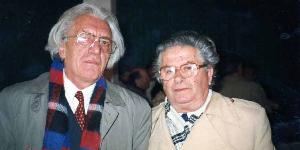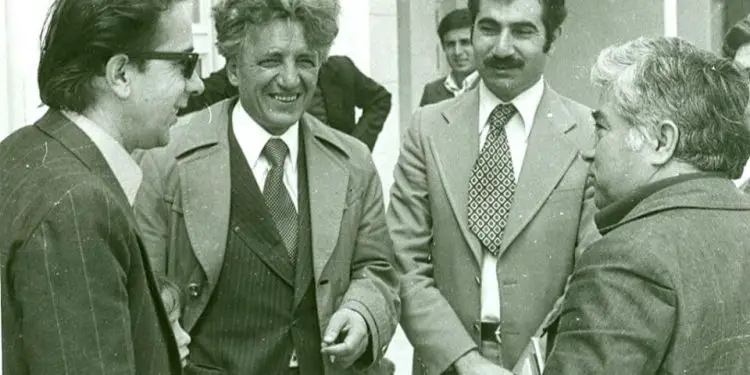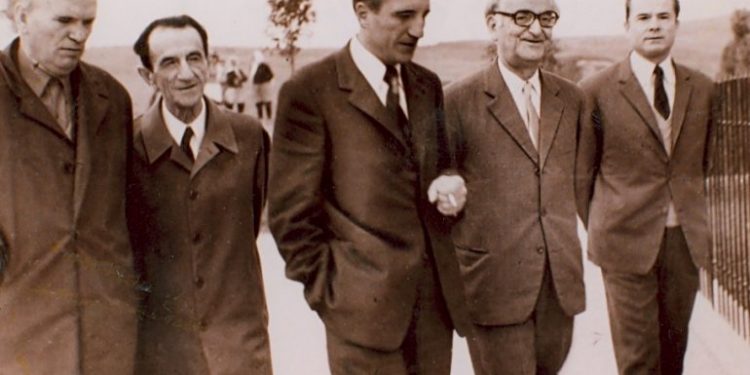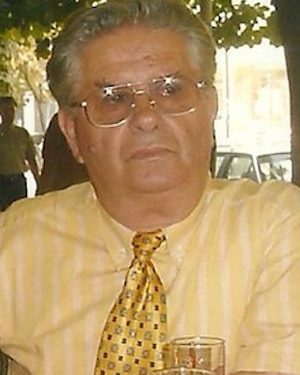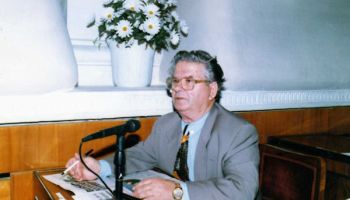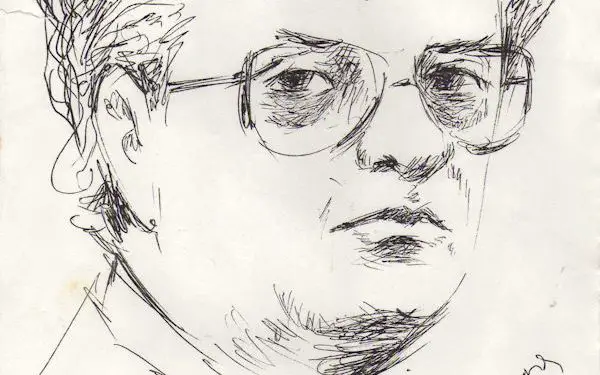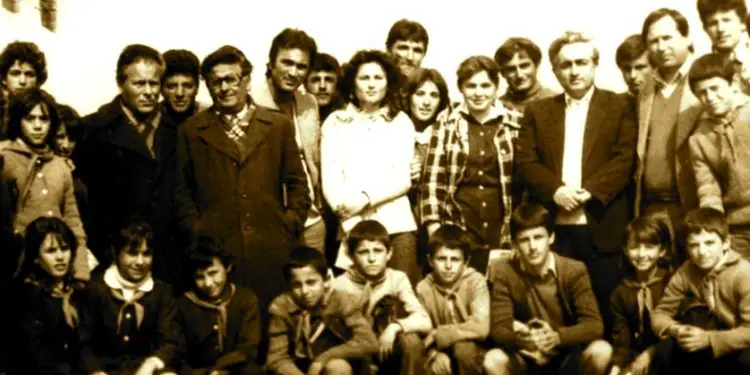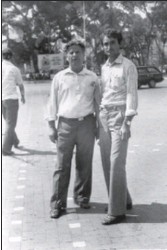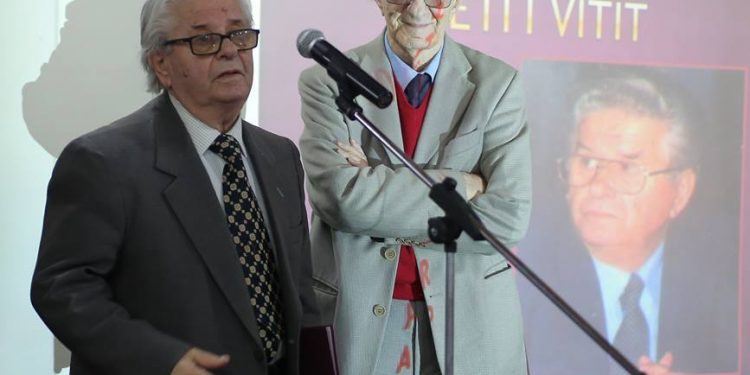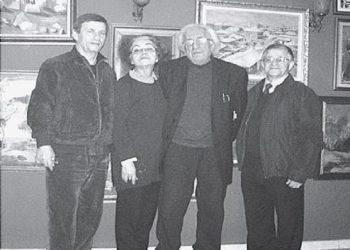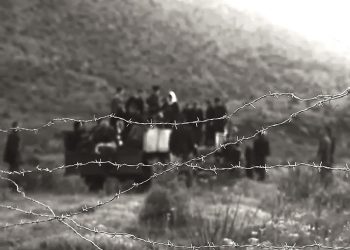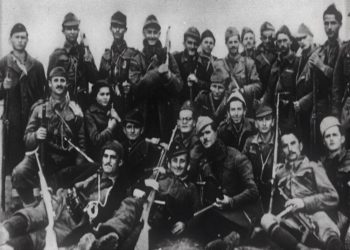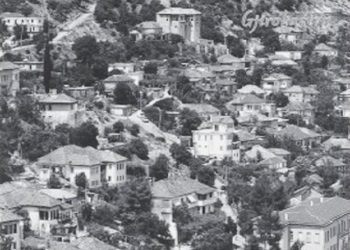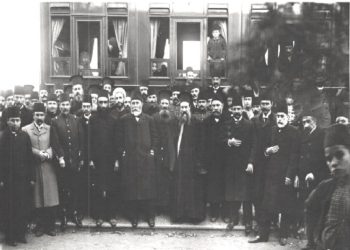By Faslli Haliti
Memorie.al /brings excerpts from the memories of the writer and poet Faslli Haliti, who in the early ’70s was sent into production as a shovel worker for years in the fields of Myzeqe and the Municipality of Lushnja due to its volume poetic “Sun and streams”, where he was accused of “promoting reality”. As the rebellious and problematic poet of the regime recalls, the heated discussions and debates in the League of Writers and Artists of Albania between Kadare and Agoll, as well as the position of other writers such as: Viktor Qurku, Agim Shehu, Luan Qafëzezi, etc.
I receive an invitation from the Writers’ League. On March 15, 1973, a meeting was organized with all the poets, in the League hall. I left for Tirana. The meeting began. They put me in the presidium. The meeting was chaired by Dritëro Agolli. Ismail Kadare was also in the presidium. Dhimitër Shuteriqi was in the hall. He sat in the front row and kept notes of whoever was discussing. It seems to me that he was keeping the meeting protocol himself.
Many creators and critics spoke and discussed at the meeting. They criticized my poem, some of my poems, especially the poem of “The Man with the Cobra”, “Self-Service”, etc., etc. In addition to my poem, they also criticized Viktor Qurku’s poem “Splendor”.
The poem “The Man with the Cobra” was especially attacked by the two military pseudo-poets, I.G. and L.D., et al. When military creators spoke and discussed, they rolled up their sleeves. Their revan was wildly foaming. They were not kept. They also started criticizing Ismail Kadare for the story “Decomposition”, “Provocation” etc. In this meeting was attacked the poem “Why are these mountains thought”, by the playwright officer, B.K.
With this playwright I had traveled the day before by train, coming to Tirana. Along the way he kept me cold. He spoke ill of me about some of Kadare’s creations as well as about the poem “Why are these mountains thought”. I wondered. I objected. Now that he was speaking at the meeting about the poem, now that he was criticizing it, I realized that the military seemed to have a grudge against Kadare and those he had in mind for Kadare. Who was building these soldiers, who was opening their eyes and mouths to them?!
I just listened. I did not discuss, I did not self-criticize the poem, the poems that were criticized. Viktor Qurku, discussed. Well discussed. He did not self-criticize. He was convinced that his poem was not wrong.
Kujtim Spahivogli spoke after Viktor Qurkut. The memory was of the opinion that the poem “Sun and Streams” should have been more powerful. So, he demanded more of her when she, as she was, was being criticized for being harsh and blackening the wonderful socialist reality. Kujtim Spahivogli said that Viktor should show more buonsens in his discussion. He said Kadare and his comrades in the 1960s had shown a lot of boons during the debate with the “old guard” of writers.
Qamil Buxheli, among other things, defended my poem “Self-Service”. This poem was criticized as a manifesto of hermeticism, as a poem calling for the replacement of proletarian partisanship with the bourgeois one. This poem was later criticized in the newspaper “Zeri i Popullit” by Fiqret Shehu, a year later Fiqreti criticized this poem for the same thing, as well as the poem “Man with cobras” in the magazine “Rruga e partisë” No. , the year 1974 on the occasion of an anniversary of the speech of March 15, 1973 of Enver Hoxha.
Ruzhdi Pulaha defended the poem “The Man with the Cobra”. He said:
-Are your uncritical military like that?
With these words, Ruzhdiu addressed the military writers who had this poem very loud. Dritëro Agolli said about the poem “The man with the cobwebs”. – Faslliu is better. Some boast of cobras. The bus bill taker also lifts his jacket and shows us the cobweb.
Dalan Shapllo in his discussion said that Faslli Haliti’s poems are powerful, realistic and sincere, etc., etc.
This is how Dritëroi spoke to me in the presence of others and in the presence of the young poet Fatbardh Rustemi:
“I also write poetry, but you Faslli write manly poetry, etc., etc.” Dritëroi told me.
And now he said, let’s see how the poem “Man with cobras” will stand, in light of the last speeches of the Party. “Anyway. His work. Someone told me:
“Another is talent, another is character, dear friend.”
Only later would I understand these words.
Kadare also spoke at the meeting. He said about Razi Brahimi that:
“Raziu has police look at poetry.”
Ismail Kadare spoke about the treatment of major topics. When Ismaili said that language is not a superstructure of the base, that this folly of the Soviet academic Marri was repeated by Razi Brahimi, judging the words as a superstructure of the base, but Dritëro Agolli intervened and opposed Ismaili, saying: “The real word it has no class character, but when it turns into a stylistic figure, it takes on a class connotation ”.
Ismaili did not respond to Dritëroi’s objection.
Then Luan Qafëzezi discussed, who attacked Fadil Paçrami in his discussion. He said that Fadil Paçrami had called the poem “Baballarët” conservative, etc., etc., which I do not remember.
Listening to Luan Qafëzezi criticizing Fadil Paçrami, I remembered the words of Agim Shehu who the night before the meeting in the League hall, had said to me: I know who is the political “rrufjani” he is talking about Enver Hoxha?
– No, I say, – I do not know. And how can I know. Why do you ask me this question, Agim. What do I have to do with these things?!
Agim told me nervously: “Even your Ismaili is not without anything. He also acts with clicks. So do not idolize me. Heard “?!
I say sharply to Agim Shehu: “Listen, Agim Shehu, Ismail Kadareja, he is not only mine, he is from all over Albania, he is also your childhood friend. I know you are friends even now. How do you talk to me about Ismail? Where will you go out? “Speak more clearly.”
– “I can tell you that for now. The political thug that Enver Hoxha talks about in his speech is Fadil Paçrami, who is not valid neither for secretary nor for cooperative chairman. Therefore, to maintain a critical attitude towards Ismail Kadare. Do not consider me an idol “, replied Agimi.
“I have kept it for an idol and I will keep it for an idol,” I say.
“Well,” he tells me, “do as you please.”
We parted. Now that Luan Qafëzezi criticized Fadil, the conversation with Agim became clear to me.
When Luan Qafëzezi was still talking about Fadil, Ismail Kadare was taken away. He says to Dritëro:
– “More Dritëro, intervene … What is he talking about”?!
Dritëroi did not interfere with Luan. He let her speak as she pleased.
Seeing this scene that was clear to me after the conversation with Agim Shehu, I realized that Ismail Kadare was not at all aware of what was happening. Agim Shehu as it turned out later had been well informed.
The next day it was learned that Enver Hoxha had severely criticized Fadil Paçrami. Everything was clarified.
In the light of this speech, the secretary of the Lushnja Party Committee, Rrapi Gjermeni, organized a meeting that I can now call a real medieval autodafe, Rrapi himself an inquisitor.
At the end of the meeting, which lasted until midnight, Kadare anxiously said to me: “And now, Faslli, where are you going to sleep?”
-In the hotel – I told him.
We parted.
Actually, I did not sleep in the hotel, but in Viktor Qurku’s apartment. We did not actually sleep like two heavily criticized, but we spent the night talking about our poems, whether or not they were actually as wrong as it was said…
We spent the night discussing the subject and looking at paintings in Iskustvo magazines, Victor’s collection./Memorie.al




